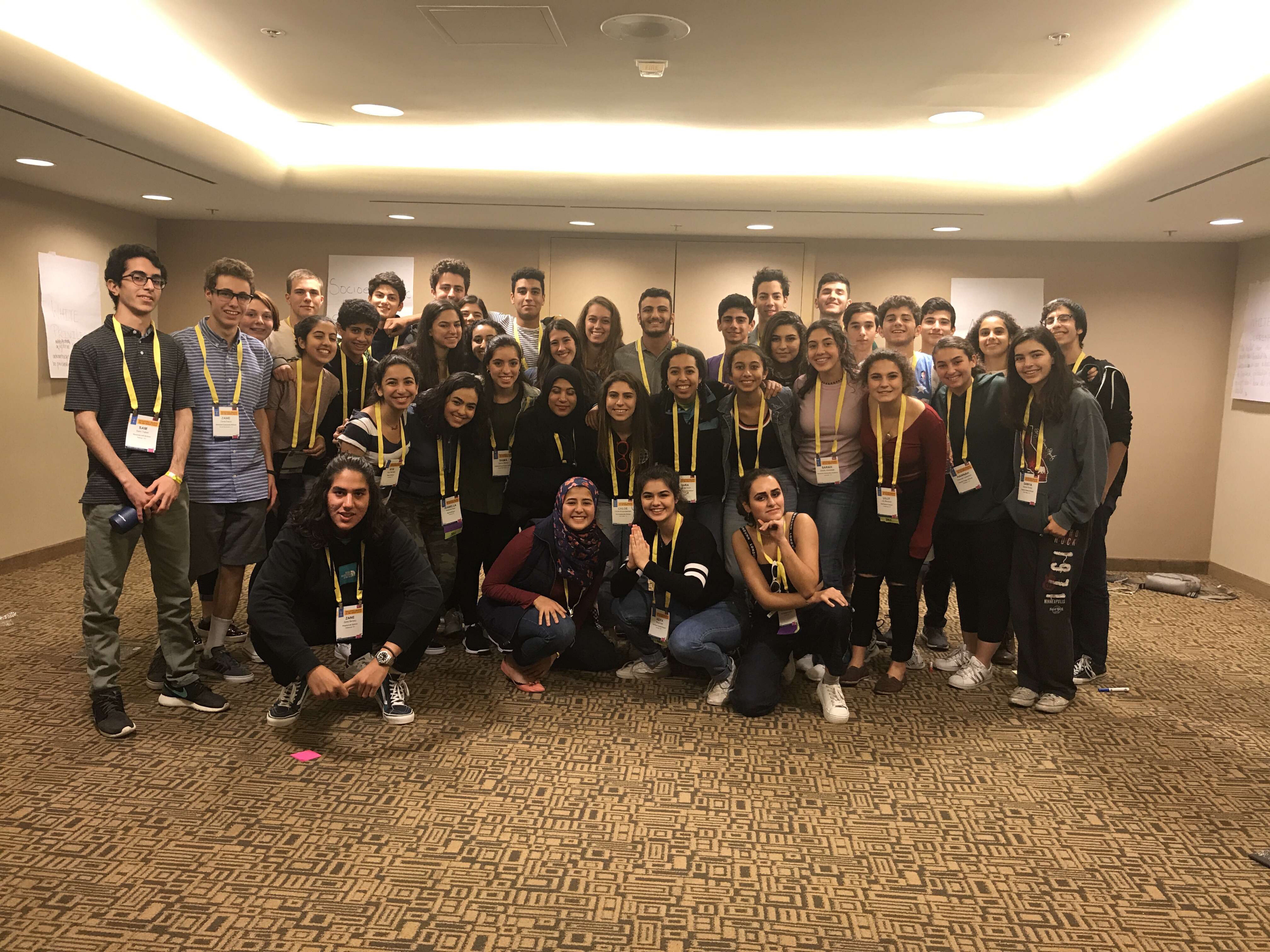You know what’s difficult? Being MENA (Middle Eastern North African) — specifically, noticeably MENA. Apparently, ever since 9/11, being from that region of the world has been a pain. I don’t recall what life was like before that because I was just 1 year old when the attack happened. Being racially profiled and arriving at the airport early to anticipate the time taken to be “randomly selected” has always been normal to me. I have never known a life before that.
I am proud of my Syrian-Lebanese roots — I always have been, and I always will be. My grandparents always called me their “Arabi princess,” and every Sunday my grandma and I would spend hours in the kitchen making kibbeh and ma’amoul. My dad and I still go to our local Mediterranean bakery to buy unsalted cheese for halawet el jibn and to enjoy warm sfihas. I wanted to be Arab — it is who I am almost entirely. I used to get excited when someone told me I looked Syrian or Lebanese. It made me proud. Everything was fine for me until I grew older and realized that being Arab wasn’t something society viewed the same way I did: Being Arab isn’t an asset — it’s a liability.
Learning about terrorism
When I was in the fourth grade, this truth became evident to me for the first time. Bush had issued a war on terrorism in 2001, and, ever since there was a hunt for the leader of Al-Qaeda — Osama bin Laden. In May 2011, he was killed by the U.S. Special forces in Pakistan, and, needless to say, my school at the time was rejoicing. I, on the other hand, didn’t know why.
For some reason, all my peers had heard of terrorists and terrorism, but that was something my parents never talked about in my house. I just tagged along and rejoiced with my classmates, oblivious. It wasn’t until my teacher sat us down and made us watch a BrainPop video that terrorism kind of started to make sense. After the video finished, a student next to me said, “Arabs and Muslims should die.”
The correlation between being Arab or Muslim to terrorism made no sense to me, so I asked my dad about it. He, naturally, grew paranoid, and told me, “If someone ever calls you a terrorist, you have to let it go. Don’t start conflicts over that. Don’t give people a reason to attack you. If someone asks where you are from, don’t say you are Arab!” That was the first time I was aware of my ethnicity in a negative way.
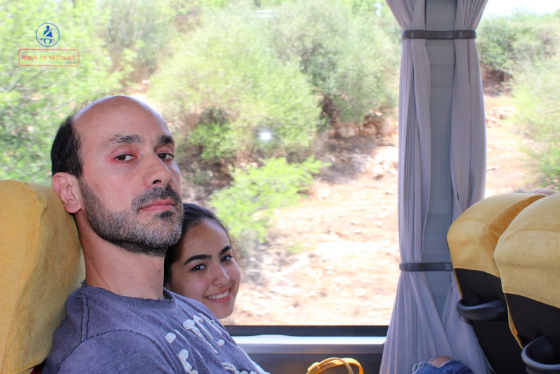
Racial profiling and risks of harassment
Suddenly, it all started to make sense. I started to pick up on how seemingly friendly TSA agents would only be talking to my family; I realized they pulled us aside because we were Arab, not because they cared about where we were going. I started to notice how my dad never told anyone his ethnicity, and how being pulled aside at the airport or in social settings had nothing to do with what he was wearing but how he looked.
Soon, I started to feel ashamed of being Arabi. All the ethnic features I used to embrace I tried to hide. I didn’t like my manly, thick eyebrows and curly hair. The worst part is, no one thought there was anything wrong with me thinking this way. My parents repeatedly explained when I was too young to understand that the government racially profiles people, and that there was nothing I could do to prevent the racism and Islamophobia — I just had to accept it. It seemed obvious to me that parading my ethnicity could put the entire family at risk of harassment.
At the time, my parents didn’t have their American citizenship, so I understand now why they were afraid. Looking back, I think it’s ridiculous that I had to have that conversation with my parents at all. Why do I have to hide my ethnicity to avoid being harassed? Why can’t we, as a society, make racial profiling and discrimination as socially unacceptable as being Arab, Persian or wearing a hijab in public seems to be?
Menace in the media
As terrorism increased in the western world, the news and movies increasingly portrayed Arabs, Persians, Muslims, and all other Middle Easterners and North Africans as terrorists. The problem is: not all people who identify as MENA are terrorists, and not all terrorists are MENA. Not all people who identify as MENA are Muslim, and not all Muslims are MENA.
The media controls what we see, so how can I expect anyone to know any different when the only representation we get is negative? When I say it makes me uncomfortable when someone calls me ISIL, a terrorist, or anything of that nature, I really mean it makes me scared.
My dad taught me to conceal my identity so much that I didn’t own up to it until my freshman year of high school. He didn’t even let me maintain my friendships with people living the Middle East because he knew that the FBI would be monitoring our conversations and not be aware of the innocence of the friendship. Telling someone my ethnicity was a big fear for me because I did not know what that could mean for my family. We have relatives in Lebanon and Syria, and, just by association, any ties to those countries automatically makes my family an eminent concern.
The lack of representation in my life made me feel like I was alone and that I was overreacting and over analyzing what was happening to me. The thing is, my story is not unique.
Finally not alone
One of the most transformative experiences of my life was at the SDLC, which stands for the Student Diversity Leadership Conference. Right off the bat, we had a silent activity that required you to stand when your identifier was called out. Every time I had done that activity in the past, I would always have to stand up for “other” because MENA would never be called. This was not the case at the conference: I was genuinely stunned when I heard “Middle Eastern and North African,” because it was so unexpected.
I stood up and looked at the other people who stood: All of us looked equally surprised to have our identifier acknowledged. When you think of it, it is interesting that in all of our years of living our identifier had never been legitimized up until that point.
We got into affinity groups later that day, and the MENA people immediately bonded, loudly in true stereotypical fashion. We joked that it had been the first time we had met other MENA people who weren’t part of our family and that we were obviously the MENA group because half of us showed up late. Even though we were together for only a few hours, we discussed issues like terrorism, representation, and racial profiling, only veering off topic for a few seconds to crack some jokes here and there. We all had so many bottled up emotions, and we had never had a safe space to let them out.
For many, it was the first time that we felt like there was a community we could relate to because we had people to identify with. There were only about 40 of us in our group out of the 1,600 people who attended the conference. We have all grown up in a post-9/11 society that has taught us to be ashamed of who we are. I realized after this conference that, we need positive media representation to show the true face of the Middle East and North Africa. It was only after I attended this conference that I regained my pride in being Arab. Being exposed to new people who had similar experiences to my own put into perspective how normalized my abnormal emotions were, and how my feelings weren’t just overdramatic– they were valid. It took me until I was 17 to fully embrace my identity, and I think that the second I learned to appreciate my roots, I learned to completely love myself.
Shared Experiences
MENA teens of Muslim, Christian, and Jewish backgrounds who attended SDLC 2017 from across America shared their stories, too. These stories were collected via Snapchat DM and email.
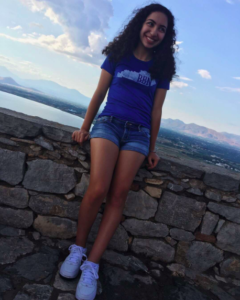
One day in English class, we were left to have a free period. We were all on our laptops, and I saw two guys and a girl in the corner watching videos with the sound on. I guess they didn’t think I could hear them, but they were watching a video with a large explosion followed by an ‘allahu akbar.’ They all laughed, not regarding any of the other people in the classroom. The teacher did not say anything and just let them continue with what they were doing. I am not and was not very religious at the time, but it was frustrating to see that they thought it was something to laugh at. It was annoying because it felt like they had no consideration of the people around them. They were my peers laughing at something that felt like it was a part of me, so it was like they were laughing at who I was. I was actually really sad when I heard them because I consider them friends, but it was kind of odd to see this side of them that they wouldn’t show straight to my face. I also just didn’t and couldn’t understand why something like that was amusing.
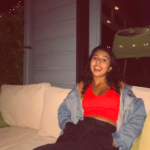
Being a multicultural person, people don’t always realize that I am Middle Eastern. When I tell people that I am Palestinian, there is always some kind of reaction: surprise, confusion, or sometimes a reaction that lets me know their bias against me. As a result of the Palestinian-Israeli conflict, people often have negative perspectives of Palestinians, due to the media portrayal. It’s always very saddening when in schools we only learn about Israelis being victims, and it can feel like the story of my people is not valued.
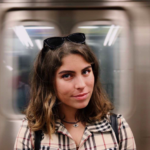
I’m white-passing, so I don’t often experience full-on racism, but my brother was called a terrorist for the first time when he was only 9 years old. Being MENA is weird when you’re mixed because everyone in your family has different skin tones, so the discrimination differs between everyone. The [so-called] Muslim ban was also something that was really painful for my family. It was hard to keep a straight face when we talked about it in my politics class, because all I wanted to do was cry.
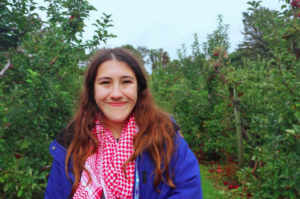
Before SDLC, I stared at the form, wondering what box to check, what affinity group I’d be in. Would I be in the white, or Middle Eastern, or multiracial affinity group? With whom did I identify most? Did I deserve to be with the Middle Eastern kids when I didn’t speak Arabic, wasn’t Muslim, and was never mistaken for Arab? Did I want to be with the white kids who didn’t understand what it like having an immigrant parent?
Driven partly by curiosity and partly by longing, I checked “Middle Eastern Affinity Group” and hoped for the best.
As soon as I entered the room, my questions and worries melted away. I was reminded of the Middle East’s incredible diversity of faith and language and origin and appearance. When you walk into a room full of black, brown, red hair, blue, hazel and brown eyes, skin of all tones, girls in hijabs and shorts alike, crosses and Jewish stars hanging off necks, your first thought is not of rejection but of peace. I found a place with my affinity group, even when I was afraid I wouldn’t, and the conversation that lasted hours felt like only a couple of minutes. While we laughed and bonded and expressed differences, the energy in the room was frenzied — we couldn’t get out our words fast enough. The feeling in the end was of a full heart, and I carry the feeling of acceptance with me wherever I go. I feel like I can speak for us, defend us in debates, be proud of our accomplishments, all because at SDLC I found an us to identify with.
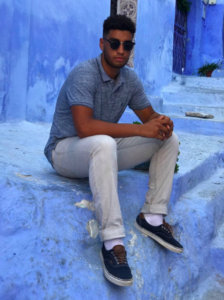
My family and I speak Moroccan in public. One day, we were in the supermarket minding our business having conversations with one another. While we were in line, my father and I realized that we had forgotten something and quickly left to grab it — leaving my mom to stay in line alone. When we were coming back, we heard a lot of screaming coming from the area my mom was, and, as we got closer, we saw an old man pushing our stuff off the conveyor belt claiming that we weren’t good enough to use the same one as him. He told us to take our terrorist speaking selves back to our country.
One attendee from the conference shared his poem on his experience as a Palestinian. He recited it too all 1,600 people. He has kindly shared his poem with me. Click here to read it.

